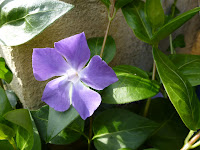Storm clouds at evening over the fields under
John Clare’s ‘circling sky’ – Glinton – two miles from where John Clare lived as a child and a young man - and where his beloved Mary Joyce lived – his childhood sweetheart and muse – whose grave lies in the churchyard immortalised by him in his poem 'Glinton Spire' –
 |
| parts of the wood were carpeted with wood anemones |
Clare was
happiest in places untouched by human hand, where he was ‘left free in the rude rags of nature’ where ‘my wild eye in rapture adores every feature.’
Royce wood was full of birdsong as I stepped inside – carpeted with celandines lighting up the woodland floor – the first stitchwort of spring pure white stars in a scattering of bluebells – wood anemone thriving and living up to its name ‘windflower’ nodding under a breeze
'The wood is sweet, I love it well
In spending there my leisure hours
To look the snail its painted shell
And search about for curious flowers.
Or ‘neath the hazel’s leafy thatch
On a stulp or mossy ground
Little squirrels gambols watch
Oak trees dancing round and round…'
 |
| an early purple orchid |
 |
| violets nestling with celandines |
 |
| ground ivy has a fabulous scent when you crush its leaves |

The lovely pasque flower grows on the nature reserve at Barnack Hills and Holes, just as they did in Clare's day –
' ...I have found some in flower today which is very early but it is a very early spring ... & I could almost fancy that this blue anenonie sprang from the blood or dust of the romans for it haunts the roman bank of this neighbourhood & is found no were else it grows on the roman bank agen swordy well & did grow in great plenty but the plough that destroyer of wild flowers has rooted it out of its long inherited dwelling it grows also at the roman bank agen Burghley Park in Barnack Lordship...'
– and wild cherry was in full blossom against the bright April sky – where Clare walking dreaming of ‘islands of Solitude’ – preferring nothing to wandering alone in the woods and fields, a book in his pocket – peering closely into wild flowers and watching birds and insects and climbing trees for birds’ nests – writing of ‘the quiet love of nature’s presence’–
– ‘we heard the bells chime but the fields was our church and we seemed to feel a religious feeling in our haunts’ –
– clumps of forget-me-nots were growing at the edge of the path leading down to Bushy Wood where Clare often wandered botanising – it was there I found a lone oxslip, quite a rare find these days –
'For everything I felt a love
The weeds below, the birds above'
– and nightingales still sing on Bainton Heath near to Lolham bridges where Clare inscribed his name into the Barnack stone – just decipherable under a single-arch bridge spanning what used to be three low-lying open fields in Clare’s childhood – before the Enclosure Act arrived on his patch and denied him the right to roam any more – we arrived as dusk was falling on a cold April evening but undeterred by the damp chill they poured out their song into the gathering darkness – 'we now may be assured that the summer is nigh at hand' wrote Clare – and composed one of his greatest poems inspired by his long hours observing nightingales in their habitat, 'The Nightingale's Nest '.
John Clare was our greatest nature poet, a complete original with ‘a relish for eternity’. He describes
' ....my origin as love divine
An essence to be crushed but never die
That like a light hereafter shall arise.'














































